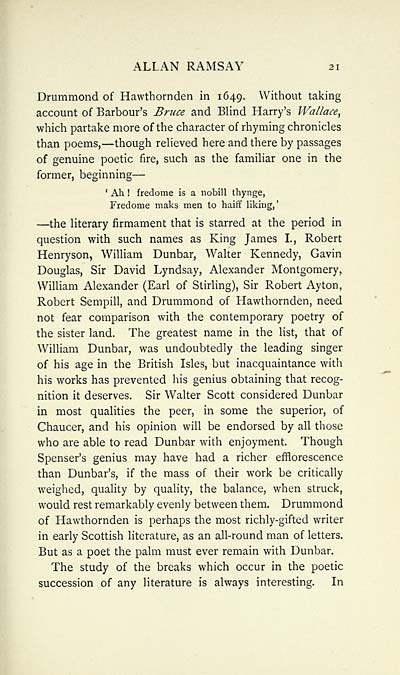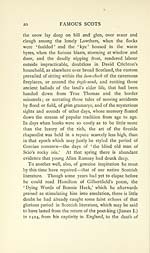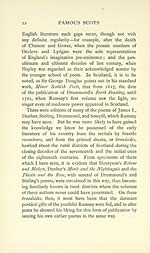Glen Collection of printed music > Printed text > Allan Ramsay
(25) Page 21
Download files
Complete book:
Individual page:
Thumbnail gallery: Grid view | List view

ALLAN RAMSAY 21
Drummond of Hawthornden in 1649. Without taking
account of Barbour's Bruce and Blind Harry's Wallace^
which partake more of the character of rhyming chronicles
than poems, — though relieved here and there by passages
of genuine poetic fire, such as the familiar one in the
former, beginning —
* Ah ! fredome is a nobill thynge,
Fredome maks men to haiff liking,'
— the literary firmament that is starred at the period in
question with such names as King James L, Robert
Henryson, William Dunbar, Walter Kennedy, Gavin
Douglas, Sir David Lyndsay, Alexander Montgomery,
William Alexander (Earl of Stirling), Sir Robert Ay ton,
Robert Sempill, and Drummond of Hawthornden, need
not fear comparison with the contemporary poetry of
the sister land. The greatest name in the list, that of
William Dunbar, was undoubtedly the leading singer
of his age in the British Isles, but inacquaintance with
his works has prevented his genius obtaining that recog-
nition it deserves. Sir Walter Scott considered Dunbar
in most qualities the peer, in some the superior, of
Chaucer, and his opinion will be endorsed by all those
who are able to read Dunbar with enjoyment. Though
Spenser's genius may have had a richer efflorescence
than Dunbar's, if the mass of their work be critically
weighed, quality by quality, the balance, when struck,
would rest remarkably evenly between them. Drummond
of Hawthornden is perhaps the most richly-gifted writer
in early Scottish literature, as an all-round man of letters.
But as a poet the palm must ever remain with Dunbar.
The study of the breaks which occur in the poetic
succession of any literature is always interesting. In
Drummond of Hawthornden in 1649. Without taking
account of Barbour's Bruce and Blind Harry's Wallace^
which partake more of the character of rhyming chronicles
than poems, — though relieved here and there by passages
of genuine poetic fire, such as the familiar one in the
former, beginning —
* Ah ! fredome is a nobill thynge,
Fredome maks men to haiff liking,'
— the literary firmament that is starred at the period in
question with such names as King James L, Robert
Henryson, William Dunbar, Walter Kennedy, Gavin
Douglas, Sir David Lyndsay, Alexander Montgomery,
William Alexander (Earl of Stirling), Sir Robert Ay ton,
Robert Sempill, and Drummond of Hawthornden, need
not fear comparison with the contemporary poetry of
the sister land. The greatest name in the list, that of
William Dunbar, was undoubtedly the leading singer
of his age in the British Isles, but inacquaintance with
his works has prevented his genius obtaining that recog-
nition it deserves. Sir Walter Scott considered Dunbar
in most qualities the peer, in some the superior, of
Chaucer, and his opinion will be endorsed by all those
who are able to read Dunbar with enjoyment. Though
Spenser's genius may have had a richer efflorescence
than Dunbar's, if the mass of their work be critically
weighed, quality by quality, the balance, when struck,
would rest remarkably evenly between them. Drummond
of Hawthornden is perhaps the most richly-gifted writer
in early Scottish literature, as an all-round man of letters.
But as a poet the palm must ever remain with Dunbar.
The study of the breaks which occur in the poetic
succession of any literature is always interesting. In
Set display mode to: Large image | Transcription
Images and transcriptions on this page, including medium image downloads, may be used under the Creative Commons Attribution 4.0 International Licence unless otherwise stated. ![]()
| Special collections of printed music > Glen Collection of printed music > Printed text > Allan Ramsay > (25) Page 21 |
|---|
| Permanent URL | https://digital.nls.uk/91278586 |
|---|
| Description | Scottish songs and music of the 18th and early 19th centuries, including music for the Highland bagpipe. These are selected items from the collection of John Glen (1833 to 1904). Also includes a few manuscripts, some treatises, and other books on the subject. |
|---|
| Description | The Glen Collection and the Inglis Collection represent mainly 18th and 19th century Scottish music, including Scottish songs. The collections of Berlioz and Verdi collected by bibliographer Cecil Hopkinson contain contemporary and later editions of the works of the two composers Berlioz and Verdi. |
|---|

